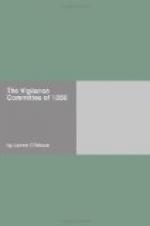I shall now pass to the conduct of the Executive Committee in their arrests, their domiciling visits, and their enforced banishments. Among their victims in the category, banished from the State with the penalty of death if they returned to it, were Charles P. Duane, Billy Mulligan, Billy Carr, Reub. Maloney, Bill Lewis, Martin Gallagher, Woolley Kearney, Yankee Sullivan the pugilist, and John Crowe. These, with the exception of Charley Duane, were all Democrats, devoted to Broderick. Duane had been a Whig, was opposed to the Democrats, yet felt kindly toward Broderick. On the other side — they could not be called Republicans, but were always against the Democrats, and had at last affiliated with the Know-Nothings — were men as notorious as any named above, and of really worse character; but not one of these did the Committee molest. They were either received into its military ranks or were permitted to remain in the city. It was a noticeable discrimination; no reason for it was apparent or expressed on the part of the Executive Committee.
Charley Duane was a man of extraordinary character in his line of life. He had made reputation as a “handy man in a fight” and a very hard one to master before he came of age, in New York. He came to San Francisco early in 1850, in company with Tom Hyer, the champion prize-fighter. He had got the sobriquet of “Dutch Charley” in New York, notwithstanding his Irish blood. Hyer euphonized this into “German Charles.” Hyer returned to New York, Duane remained here. He was a zealous, very active Whig, an equally zealous and active fireman; and was once elected Chief Engineer of the Department, against George Hossefross. Subsequently he was appointed one of the Sheriff’s deputies. He had killed a Frenchman in a difficulty, was tried for the deed and acquitted. No charge of dishonest nature — theft, fraud, swindling, embezzlement, or anything of the kind, was ever brought




